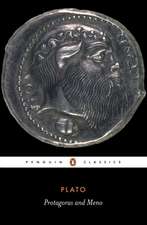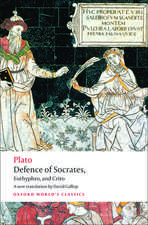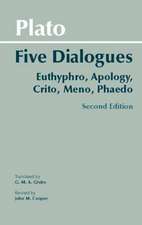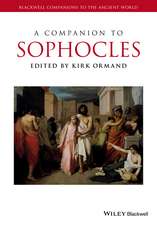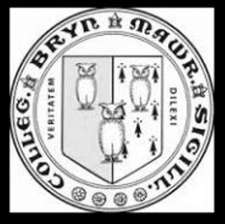Sophist: or The Professor of Wisdom
Autor Plato Traducere de Eva Brann, Peter Kalkavage, Eric Salemen Limba Engleză Paperback – 1996
Preț: 85.40 lei
Preț vechi: 93.30 lei
-8% Nou
Puncte Express: 128
Preț estimativ în valută:
16.34€ • 17.11$ • 13.52£
16.34€ • 17.11$ • 13.52£
Carte disponibilă
Livrare economică 18 martie-01 aprilie
Preluare comenzi: 021 569.72.76
Specificații
ISBN-13: 9780941051514
ISBN-10: 094105151X
Pagini: 104
Ilustrații: Illustrations
Dimensiuni: 9 x 215 x 5 mm
Greutate: 0.13 kg
Ediția:New ed.
Editura: Focus Publishing
Colecția Focus Publishing (US)
Locul publicării:United States
ISBN-10: 094105151X
Pagini: 104
Ilustrații: Illustrations
Dimensiuni: 9 x 215 x 5 mm
Greutate: 0.13 kg
Ediția:New ed.
Editura: Focus Publishing
Colecția Focus Publishing (US)
Locul publicării:United States
Notă biografică
Plato was an ancient Greek philosopher born in Athens during the Classical period in Ancient Greece. In Athens, Plato founded the Academy, a philosophical school where he taught the philosophical doctrines that would later become known as Platonism. Plato (or Platon) was a pen name derived, apparently, from the nickname given to him by his wrestling coach - allegedly a reference to his physical broadness. According to Alexander of Miletus quoted by Diogenes of Sinope his actual name was Aristocles, son of Ariston, of the deme Collytus (Collytus being a district of Athens).Plato was an innovator of the written dialogue and dialectic forms in philosophy. He raised problems for what later became all the major areas of both theoretical philosophy and practical philosophy. His most famous contribution is the Theory of forms, which has been interpreted as advancing a solution to what is now known as the problem of universals. He is also the namesake of Platonic love and the Platonic solids.His own most decisive philosophical influences are usually thought to have been, along with Socrates, the pre-Socratics Pythagoras, Heraclitus, and Parmenides, although few of his predecessors' works remain extant and much of what we know about these figures today derives from Plato himself.[a]Along with his teacher, Socrates, and his student, Aristotle, Plato is a central figure in the history of philosophy.[b] Unlike the work of nearly all of his contemporaries, Plato's entire body of work is believed to have survived intact for over 2,400 years.[6] Although their popularity has fluctuated, Plato's works have consistently been read and studied. Through Neoplatonism Plato also greatly influenced both Christian and Islamic philosophy (through e.g. Al-Farabi). In modern times, Alfred North Whitehead famously said: "the safest general characterization of the European philosophical tradition is that it consists of a series of footnotes to Plato.
Recenzii
This translation of one of Plato's most challenging dialogues is so unpretentiously honest that it risks undercutting its own significant merits. As far as I can judge, it will prove most helpful not only to students of classical studies and philosophy, but to anybody who is interested in the questions treated by the Sophist . Clarity seems to be the editor and translator's aim, and it is well achieved in: (a) an introduction which without philosophical arm-twisting brings in the views of some modern philosophers on negative and false statement (as inconclusive as Plato's), (b) a select bibliography and a summary of the arguments which students will find useful, and (c) a translation of the text in civilized modern English. Space forbids the adduction of parallel passages. However, I do not hesitate to claim that in terms of accuracy and credible conversational style, the translation will stand comparision with those of A.E. Taylor and F.M. Cornford. --David Rankin, in The Classical Review

